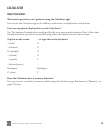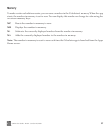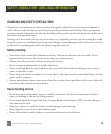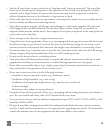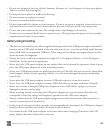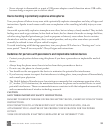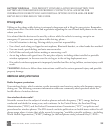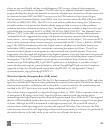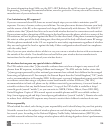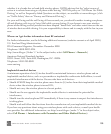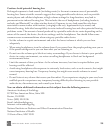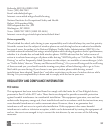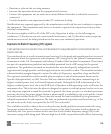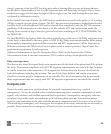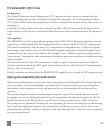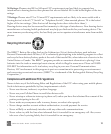
ONEm User Guide - R1.0.2 - October 20, 2010 104
For more information about SARs, see the FCC’s OET Bulletins 56 and 65 at www.fcc.gov/Bureaus/
Engineering_Technology/Documents/bulletins, www.fcc.gov/oet/ea. You may also wish to contact the
manufacturer of your wireless device.
Can I minimize my RF exposure?
If you are concerned about RF, there are several simple steps you can take to minimize your RF
exposure. You can, of course, reduce your talk time. You can place more distance between your body
and the source of the RF, as the exposure level drops off dramatically with distance. The FDA/FCC
website states that “[h]ands-free kits can be used with wireless devices for convenience and comfort.
These systems reduce absorption of RF energy in the head because the phone, which is a source of the
RF emissions, will not be placed against the head. On the other hand, if the phone is mounted against
the waist or other part of the body during use, then that part of the body will absorb more RF energy.
Wireless phones marketed in the U.S. are required to meet safety requirements regardless of whether
they are used against the head or against the body. Either configuration should result in compliance
with the safety limit.”
Also, if you use your wireless device while in a car, you can use a wireless device with an antenna on
the outside of the vehicle. You should also read and follow your wireless device manufacturer’s
instructions for the safe operation of your wireless device.
Do wireless devices pose any special risks to children?
The FDA website states that “[t]he scientific evidence does not show a danger to any users of cell
phones from RF exposure, including children and teenagers.” The FDA website further states that
“[s]ome groups sponsored by other national governments have advised that children be discouraged
from using cell phones at all. For example, the Stewart Report from the United Kingdom [“UK”] made
such a recommendation in December 2000. In this report a group of independent experts noted that
no evidence exists that using a cell phone causes brain tumors or other ill effects. [The UK’s]
recommendation to limit cell phone use by children was strictly precautionary; it was not based on
scientific evidence that any health hazard exists.” A copy of the UK’s leaflet is available at http://
www.dh.gov.uk (search “mobile”), or you can write to: NRPB, Chilton, Didcot, Oxon OX11 0RQ,
United Kingdom. Copies of UK’s annual reports on mobile phones and RF are available online at
http://www.iegmp.org.uk and http://www.hpa.org.uk/radiation/ (search “mobile”). Parents who wish
to reduce their children’s RF exposure may choose to restrict their children’s wireless device use.
Drive responsibly
When behind the wheel, safe driving is your responsibility and it should always be your first priority.
Scientific research on the subject of wireless phone use and driving has been conducted worldwide
for several years. According to the National Highway Traffic Safety Administration (NHTSA), the
available research indicates that using a wireless phone while driving degrades a driver’s performance,



